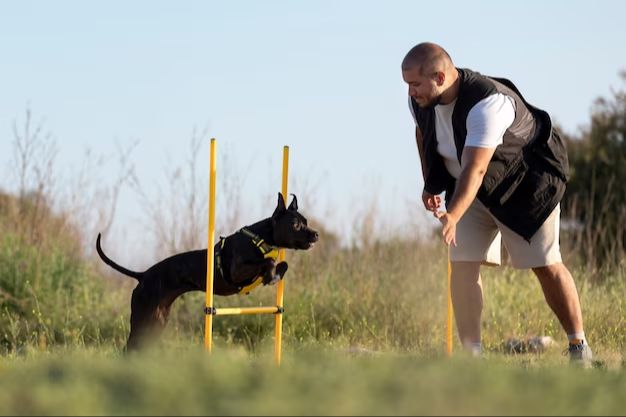Introduction
Excessive yawning is a common condition seen in dogs of all ages and breeds. While occasional yawning is normal, some dogs yawn frequently throughout the day and it may indicate an underlying medical issue. Excessive yawning can negatively impact a dog’s quality of life and be concerning for owners.
Yawning in dogs serves the same purpose as in humans – it is a natural response to fatigue or sleepiness. However, when a dog yawns more than a few times per hour on a regular basis, this is considered excessive and abnormal. Studies estimate that excessive yawning affects up to 20% of the canine population.
For affected dogs, the constant yawning can be disruptive and a source of stress. It may interfere with their daily activities, ability to rest, and comfort. Excessive yawning can also disrupt the human-animal bond if owners find it difficult to determine their dog’s needs. Understanding the causes and finding solutions is important for improving a dog’s wellbeing.
Causes of Excessive Yawning
There are several possible causes for a dog yawning excessively or more than what may be normal:

Boredom – Dogs who are bored or understimulated may yawn frequently out of boredom or lack of enrichment.
Stress/anxiety – Stress, anxiety, or excitement can also cause a dog to yawn repeatedly as a way to calm themselves down. Yawning helps relax a dog.
Fatigue – Excessive yawning can be a sign of tiredness or fatigue, just like in people. Yawning helps increase alertness.
Overheating – Dogs may yawn more when hot or overheated as a cooling mechanism. The deep breath circulates air and cools the blood in the head.
Dental problems – Dental pain, oral injuries or conditions like gingivitis can cause extra yawning. The motion stretches sore facial muscles.
Neurological issues – Conditions affecting the nerves or brain like seizures, stroke or distemper may cause frequent yawning. It’s the dog’s way to try to stimulate or regulate the brain.
Signs of Excessive Yawning
There are several clear signs that can indicate a dog is yawning excessively:
-
Yawning more than 3 times per hour without an obvious trigger like being tired. Frequent yawning for no clear reason is a red flag.
-
Yawning frequently even when the dog is well-rested and not in a situation where yawning is expected.
-
Experiencing yawning “spells” where the dog yawns repeatedly within a short time span.
-
Excessive yawning in response to normal stimuli in their environment that would not cause most dogs to yawn repeatedly.
If a dog is displaying these signs, especially yawning more than 3 times per hour on a consistent basis, it could signal an underlying medical issue. Excessive yawning is not normal behavior for dogs and should be addressed with a veterinarian.
Medical Diagnosis
If your dog is yawning excessively, the next step is to schedule an appointment with your veterinarian for a medical diagnosis. The vet will perform a complete physical exam, checking your dog’s vital signs, body condition, and looking for any abnormalities. They will also take your dog’s medical history by asking you questions about when the excessive yawning started, any changes in behavior or appetite, and if your dog is up to date on vaccines and preventative care.

Your vet may recommend specific testing to look for potential underlying conditions causing the frequent yawning. Common tests include:
- Bloodwork to check for anemia, infections, or liver/kidney issues
- Urinalysis to screen for UTIs or diabetes
- Thyroid testing to check hormone levels
- Radiographs (x-rays) to visualize the mouth, throat, and chest
Based on your dog’s symptoms and the exam findings, your vet can determine if there is an underlying medical issue causing the excessive yawning. Getting an accurate diagnosis is key before starting any treatment.
Treatment Options
If your dog is yawning excessively, there are several treatment options that can help reduce this behavior. The main goals of treatment are addressing any underlying medical conditions, training your dog, increasing physical and mental stimulation, and using medications in severe cases.

First, it’s important to have your veterinarian examine your dog to rule out any health issues that could be causing the excessive yawning. Conditions like allergies, dental problems, or neurological issues may need medical treatment to resolve excessive yawning.
Second, consider working with a professional dog trainer or behaviorist to modify your dog’s behavior. Using positive reinforcement, you can train your dog to control yawning only at appropriate times. The trainer can also help recommend ways to mentally and physically stimulate your dog more effectively.
In addition to training, make sure your dog gets adequate daily exercise and playtime. Providing interactive toys and activities can help fulfill your dog’s needs for mental stimulation as well. A tired, fulfilled dog is less likely to yawn constantly for attention or stress relief.
Finally, if no medical cause is found and other treatments are ineffective, your veterinarian may prescribe medication as a last resort for excessive yawning and attention-seeking behavior. However, medication should only be used in extreme cases under veterinary guidance, as side effects are possible.
Prevention
There are several steps you can take to help prevent your dog from yawning excessively:
Provide adequate exercise/playtime: Make sure your dog gets enough physical and mental stimulation each day through walks, play sessions, or other activities. Adequate exercise can help reduce boredom and stress.
Give mentally stimulating toys/tasks: Provide puzzle toys, chews, learning games, or opportunities for your dog to problem solve. Mental enrichment can help curb excessive yawning.
Maintain comfortable environment: Keep your home at a comfortable temperature for your dog, provide fresh water, give them their own rest space, and minimize loud noises or other stressors.
Monitor for signs of anxiety/stress: Pay attention to body language or behaviors that could indicate anxiety, fear, or overstimulation. If you notice signs of stress, try to minimize triggers and talk to your vet.
Living with a Dog that Yawns Excessively
Having a dog that yawns frequently can be challenging, but with patience, compassion, and some lifestyle adjustments, you can make living with an excessive yawning dog manageable. The key is to not get frustrated with your dog’s constant yawning. Remember that your dog is not doing this intentionally to annoy you. Excessive yawning is likely tied to an underlying medical or behavioral cause that your dog cannot control.

Have patience and try to understand what your dog may be feeling or needing when the yawning occurs. Your dog may be tired, bored, anxious, or just responding naturally to stimuli in the environment. Don’t punish or scold the yawning, as this will only add stress. Instead, focus on meeting your dog’s needs with more exercise, mental stimulation, or calming techniques.
Ongoing training is also important for managing excessive yawning. Work on basic obedience and impulse control exercises to strengthen your bond with your dog. This will help your dog relax and feel secure. You can also train your dog to do a different behavior when they start yawning, like settling on their bed. This redirects the yawning into a more constructive activity.
Lifestyle adjustments may also help minimize excessive yawning. Make sure your dog is getting adequate physical and mental exercise every day. Create a predictable routine and minimize exposure to stimuli that seem to trigger the yawning. Talk to your veterinarian about options like pheromone collars or calming supplements. Record details about when and where the yawning happens so you can identify patterns.
If excessive yawning persists despite your best efforts, consult a veterinary behaviorist. They can do a full behavioral assessment and determine if medication may help in conjunction with behavior modification therapy. With time and consistency, you and your yawner can learn to happily coexist.
Outlook
With proper treatment and management, dogs with excessive yawning can live happy and mostly normal lives. The key is identifying and addressing any underlying medical conditions early. Certain conditions like neurological disorders can be managed but not cured, while others like medication side effects or anxiety may be reversible.
Excessive yawning should not significantly impact a dog’s quality of life if caught early and properly treated. Dogs may need more rest if yawning is a symptom of fatigue, but their energy levels and enjoyment of life can be maintained. Owners may need to adapt to a slower pace and provide extra support.
There are several things owners can do to support a dog with excessive yawning:
- Give them a safe, calm environment to relax and sleep.
- Make vet appointments regularly to monitor symptoms.
- Administer medications prescribed for any underlying conditions.
- Use treats, massage, and calming aids to decrease anxiety if needed.
- Avoid overstimulation during play, training, or social interactions.
While excessive yawning can be concerning, vets can provide guidance on managing the symptom and improving quality of life. With some adjustments, dogs can continue living happy and fulfilling lives.
Warning Signs
While excessive yawning is usually harmless in dogs, it’s important to watch for signs that may indicate an underlying illness requiring emergency veterinary care. Contact your vet or an emergency animal hospital right away if your dog shows any of the following symptoms along with increased yawning:
-
Difficulty breathing or panting excessively
-
Blue gums or tongue
-
Restlessness or inability to get comfortable
-
Crying or whining in pain
-
Seizures
-
Collapsing or loss of balance
-
Vomiting or diarrhea
-
Coughing or gagging
Frequent yawning along with lethargy, weakness, or loss of appetite can also be a sign of illness in dogs. It’s a good idea to make a veterinary appointment if excessive yawning persists for more than a day or two. Getting an accurate diagnosis will ensure your dog gets the right treatment to feel better soon.
Conclusion
Excessive yawning in dogs can be a sign of serious underlying health issues or simply normal behavior. As a dog owner, being aware of the causes, signs, diagnosis, and treatment options is critical for monitoring your dog’s health and wellbeing.
The key points to remember are that persistent and excessive yawning may indicate medical problems like neurological disorders, liver disease, or respiratory disease. It’s important to consult your veterinarian if your dog is yawning excessively without obvious triggers. Through examinations and testing, vets can diagnose any underlying conditions and provide proper treatment.
While frustrating for owners, excessive yawning is treatable in most dogs with medications, therapy, or minor lifestyle adjustments. Being attentive and proactive allows dogs to live happily while managing this condition. With patience and care, yawning doesn’t have to negatively impact the bond between owners and dogs.
For further reading on excessive yawning in dogs, consult your veterinarian and reference sources like vet-authored pet health websites and peer-reviewed veterinary journals. As research continues, new insights and treatment options may emerge. Stay updated on the latest developments for providing your dog with the best possible care.